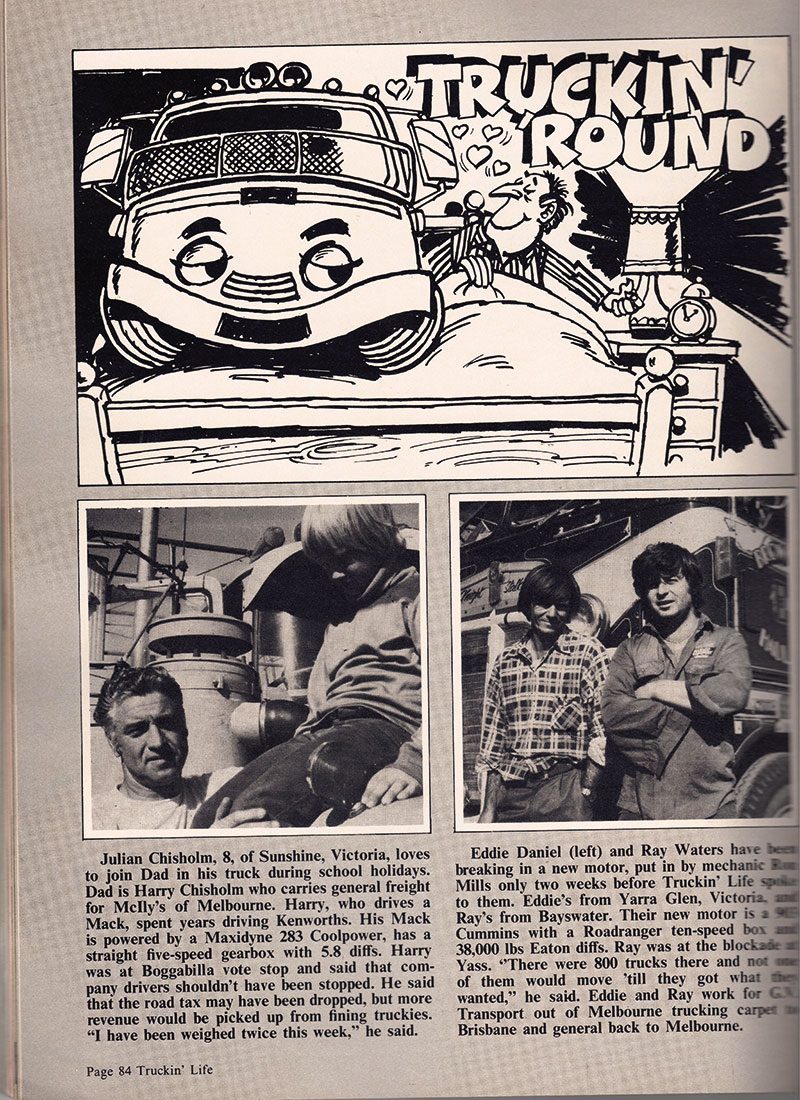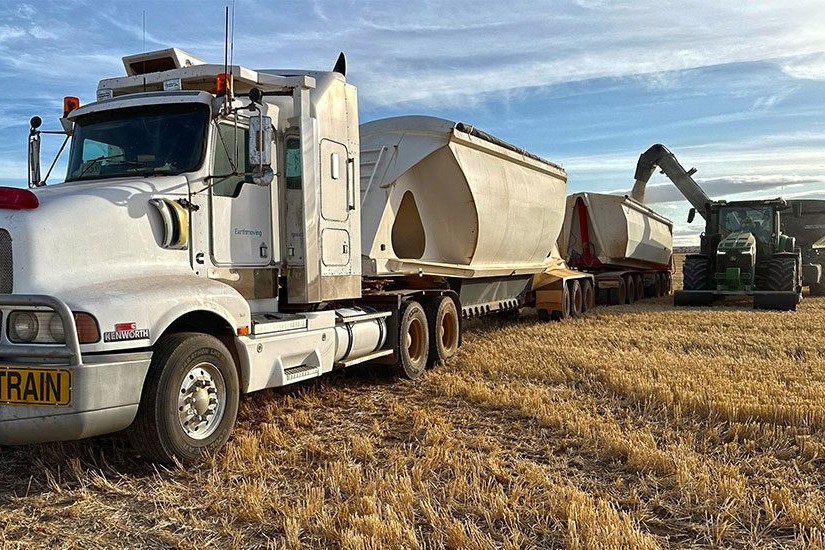When things changed forever

The 45th anniversary of the heroic Razorback Blockade is next year. After the recent induction of its protagonists into the Road Transport Hall of Fame at Alice Springs, we felt it only right to recall the events of this pivotal point in time for the Australian road transport industry.
In 1959, Australia’s road transport industry faced a looming threat – a new road tax that threatened to devastate the livelihoods of truck owner-drivers. Introduced initially in Victoria and then in every state (except Tasmania) under varying acts, these ‘road maintenance charges’ proportioned monies collected into a separate fund purely for the purpose of road maintenance. Charges were levied on a ton/mile basis driven within each state and applied to vehicles depending on their load capacities. Different states nominated different weights and lengths, placing drivers in a challenging situation; they would load legally in one state and find themselves loaded illegally in another.
Ernie Stevens and Bert Dyble, two such drivers from Frankston in Victoria, were quick to recognise the tax’s consequences, including imprisonment for non-payment. The government’s heavy-handed tactics, including using spy cars, only added to their fears.
Despite the efforts of many, the tax was implemented in 1958, and big companies started taking over the freight sector. This, combined with inadequate and slow payments, pushed many owner-drivers to the brink of financial ruin. Families suffered, marriages strained, and properties were lost due to repossession. Ernie and Bert’s arrest for the non-payment of road tax in Victoria symbolised a nationwide trend of suffering within the industry.
Against his father Ernie’s advice, Ted Stevens ventured into the trucking business in the 1960s. A third-generation truck driver, Ted faced various challenges, including attempting to outsmart the road tax system.



More than 20,000 trucks and drivers blockaded roads around the country.
In about the mid-1970s, Ted transitioned from Australia-wide work to a regular route between Melbourne and Sydney, where he engaged more often with fellow owner-drivers. Discussions about freight rates and road tax frequently took place at truck stops. Ted was a vocal advocate for change, but many struggled with financial management, leaving their families in distress. Barry Grimson emerged as an ally, and together, they reached out to the Transport Workers Union to represent owner-drivers in New South Wales. However, union promises fell short, leading to further frustration.
In 1978, collaborating with Trucks Against Government (TAG) – a non-union-aligned group made up of a coalition of owner-drivers but independent of the six men who started Razorback – Ted and Barry organised a protest involving hundreds of trucks that drove through Sydney. Despite their efforts, the transport minister remained unresponsive. Ted faced repercussions for his outspokenness, yet he remained committed to the cause. Financial struggles persisted for many, and Ted himself fell behind on truck payments due to delayed payment for his work and constant police visits for road tax. Meetings had failed to yield solutions, but Ted’s campaign along the Hume Highway to raise awareness about the challenges faced by owner-drivers had gained momentum. Despite some initial resistance, he found allies among fellow drivers who shared his concerns.
The events that made Ted “Greendog” Stevens, Barry Grimson, Spencer Wattling, Colin Bird, Jack Hibburt and Carle Goodfellow legends in the Australian trucking industry were about to explode.
Drivers, often aided by stimulants, were trying to do more work in a vain attempt to generate more income. Drivers worked themselves into the ground and suffered the medical consequences. Exhaustion led to poor judgement, which led to accidents. There was no one cause for any of it; the overall environment either prompted the issues or allowed them to develop. The more drivers did, the more they were expected to do. Some companies imposed penalties for late deliveries, further complicating the landscape.
Then, when Dick Smith began importing CB radios in about 1976, and these found their way into the cabs of trucks, the breaking down of communication barriers among drivers had begun. These radios allowed drivers to discuss their shared struggles and concerns, but initial meetings often resulted in disagreements and chaos. Amid rising tensions, Ted and others found themselves in violent altercations with other non-owner-drivers who didn’t have the same issues, union heavies and dissatisfied transport workers, foreshadowing larger civil protests in the years to come that would reshape Australia’s trucking industry.
Ted had made a vow to take a stand for change. On 2 April 1979, at about 5pm, he did so. The Razorback Mountain blockade, which would last 10 days, was set in motion. Ted, Barry, Spencer, Colin and Jack used their trucks to block the road. Despite initial doubts and fears of repercussions, the blockade gained momentum when Carle Goodfellow joined in by blocking Menangle Road at the bottom of Razorback – the Hume Highway was now closed. Late into the night, about 50 semis gathered at Razorback Mountain, and by the morning of 3 April, more than 300 had congregated. Numerous other blockades around the country were organised in unison.
Ted, standing on Jack Hibburt’s trailer, passionately articulated the grievances of the trucking industry, denouncing excessive taxes, gruelling work conditions, unfair wages and lack of union support. The drivers voiced their approval and elected Ted to lead the committee representing their cause. As the protest continued, Ted and the committee condensed their demands into a clear list, which included equitable freight rates, abolishing road tax, and ensuring equal pay for all drivers, among other key points. The drivers were resolute in their commitment to these demands.
Despite initial scepticism from the media and some within the industry, the protest gained support from unexpected sources, including country and western band Saltbush, arranged by John Laws. While rival media criticised Laws’ involvement, his radio station, 2UW, provided accurate coverage, helping to spread the message. With the support of legal experts, the protesters navigated negotiations and media scrutiny. David Galbally, a barrister, joined their cause pro bono, adding a valuable ally who believed in their mission.
After days of negotiations, Premier Neville Wran finally agreed to talk. However, the protesters were cautious, as previous discussions had yielded little progress. An alternative meeting was planned with the hope of ending the standoff. Ted and the committee faced the challenge of convincing the protesters that their goal was to find a resolution, but the decision had to be made collectively. The debate over attending the meeting raged among the protesters, with some strongly opposed and others reluctant. Ted’s confrontation with a vocal troublemaker changed the tone of the meeting, and a vote resulted in a 90% majority in favour of meeting Wran.
When concurrent blockades in other states ended without addressing core issues, Ted shared the disappointment and betrayal of politicians, particularly Wran, with the protesters at Razorback. The determination of the group remained unwavering, and they decided they needed to secure written agreements to their demands. Finally, the protesters secured parity with other states, pending the removal of blockades. Ted announced the return to work, and they held the document with Wran’s signature, solidifying their victory.
While not all their goals were met, the protesters achieved significant changes. They had abolished the hated road tax, eliminated the threat of imprisonment and gained extra loading capacity. Above all, they demonstrated that unified, peaceful protests could change the rules and reshape perceptions. They showed the world that standing together can make a difference, even in the face of government indifference. The Razorback Blockade was a testament to the power of collective action in pursuit of justice.
It remains the greatest act of insurrection in Australian history. More than 20,000 trucks and drivers in over 100 locations nationwide participated in the protest.
At the most recent Road Transport Hall of Fame Induction Ceremony held at Alice Springs (New Zealand Trucking, October 2023), a new award called the History Makers Award was initiated. The inaugural recipients of this award were the six men who stood up at Razorback. The award was created by the hall at the suggestion of industry icon Bob McMillan and Truckin’ Life editor Mike Williams, and will continue to be awarded to men and women who have made history in Australian road transport.
Read more
Mack Muster a must
0 Comments6 Minutes
Decks to Darwin
0 Comments1 Minutes




































